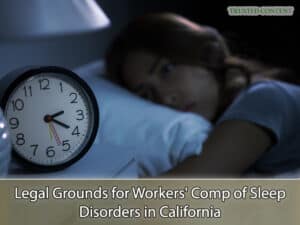Seeking California Workers’ Compensation for Loss of Sleep in Ontario
Workers' compensation in California provides crucial benefits for employees who suffer injuries or illnesses due to their work environment or duties. While physical injuries are commonly recognized and compensated, less visible consequences of workplace conditions, such as sleep disorders, also warrant serious attention. Sleep disorders can significantly impact an employee's health and productivity, and understanding how they fit into workers' compensation laws is essential for any affected worker.

Legal Grounds for Workers' Comp of Sleep Disorders in California
Legal Grounds for Workers' Comp of Sleep Disorders in California
Under California law, workers' compensation covers a variety of injuries and illnesses, including those that affect sleep. To claim compensation for a sleep disorder, the condition must be proven to be directly caused by or aggravated by the claimant’s work environment or duties. This includes disturbances such as insomnia, sleep apnea, and other serious sleep-related conditions that can be medically linked to workplace stress, exposures, or injuries.
Relevant California Legislation on Sleep Dysfunction Workers’ Compensation
The foundation of workers' compensation claims for sleep disorders is rooted in various state laws and regulations. One of the key legislative frameworks is California Labor Code 4660.1, which stipulates how impairment ratings are calculated for such conditions. Although the code restricts the increase of impairment ratings for sleep dysfunction arising from a compensable physical injury, it does not limit the ability of injured employees to seek and receive necessary treatment for their conditions.
Common Workplace Causes of Sleep Disorders
Several workplace factors can lead to the development or exacerbation of sleep disorders. These include, but are not limited to, long or irregular working hours, night shifts, high-stress environments, or exposure to hazardous materials. Identifying these factors is crucial for establishing a work-related cause in a compensation claim.
Documenting and Claiming Sleep Disorder Compensation
Steps to Filing a Claim
- Obtain a formal diagnosis from a healthcare provider, detailing how the sleep disorder is related to workplace conditions.
- Collect and document any evidence of workplace causes, such as incident reports, work schedules, or witness testimonies.
- File a claim with the employer's workers' compensation insurance, including all collected medical records and evidence.
Required Evidence
Relevant evidence includes medical reports from sleep specialists or psychologists, as well as any workplace documentation that supports the claim of the condition being work-related. This comprehensive approach ensures that all aspects of the claim are well-supported and increases the likelihood of receiving appropriate compensation.
Challenges in Proving Sleep Disorders in Workers’ Comp Claims
Claiming compensation for sleep disorders often involves navigating complex legal and medical criteria. The intangible nature of sleep disturbances can make it difficult to directly link them to specific workplace conditions without substantial medical evidence and expert testimony. Additionally, the legalities set forth by California Labor Code 4660.1 add layers of complexity in terms of what can be claimed and under what circumstances.

Role of Legal Representation in Workers' Compensation Claims for Sleep Disorders
Role of Legal Representation in Workers' Compensation Claims for Sleep Disorders
Legal assistance plays a critical role in navigating the complexities of workers’ compensation claims, especially those involving less visible conditions like sleep disorders. Lawyers with expertise in this field can offer invaluable guidance on the nuances of state laws and the best practices for documenting and strengthening a claim.
Benefits of Hiring a Workers' Compensation Lawyer
- Expertise in gathering and presenting necessary medical evidence.
- Experience in negotiating with workers' compensation insurers.
- Knowledge of legal rights and entitlements that may not be immediately apparent to the injured worker.
Addressing Challenges in Sleep Disorder Workers' Comp Claims
Despite the availability of legal recourse, employees face several challenges in proving that their sleep disorders are work-related. These include the subjective nature of sleep-related symptoms and the difficulty in directly linking them to specific work activities or environments.
Strategies to Overcome These Challenges
- Utilizing detailed medical records and expert testimonies to establish a clear link between the work environment and the sleep disorder.
- Leveraging witness statements and workplace documentation to support claims.
- Seeking expert legal assistance, ensuring all aspects of your case are explored.

Seeking California Workers' Compensation for Loss of Sleep
Seeking California Workers' Compensation for Loss of Sleep in Ontario
Navigating the complexities of workers' compensation claims for sleep disorders requires a thorough understanding of California laws and a strategic approach to claim documentation and filing. If you are struggling with sleep issues that you believe are related to your job, it is essential to seek expert legal help. At Napolin Accident Injury Lawyer, we bring extensive experience in workers’ compensation litigation to ensure that your rights are protected and you receive the compensation you deserve. Contact us today at (909) 962-8415 for a free consultation to discuss your case. Let our expertise guide you through the process to a successful resolution of your claim.
